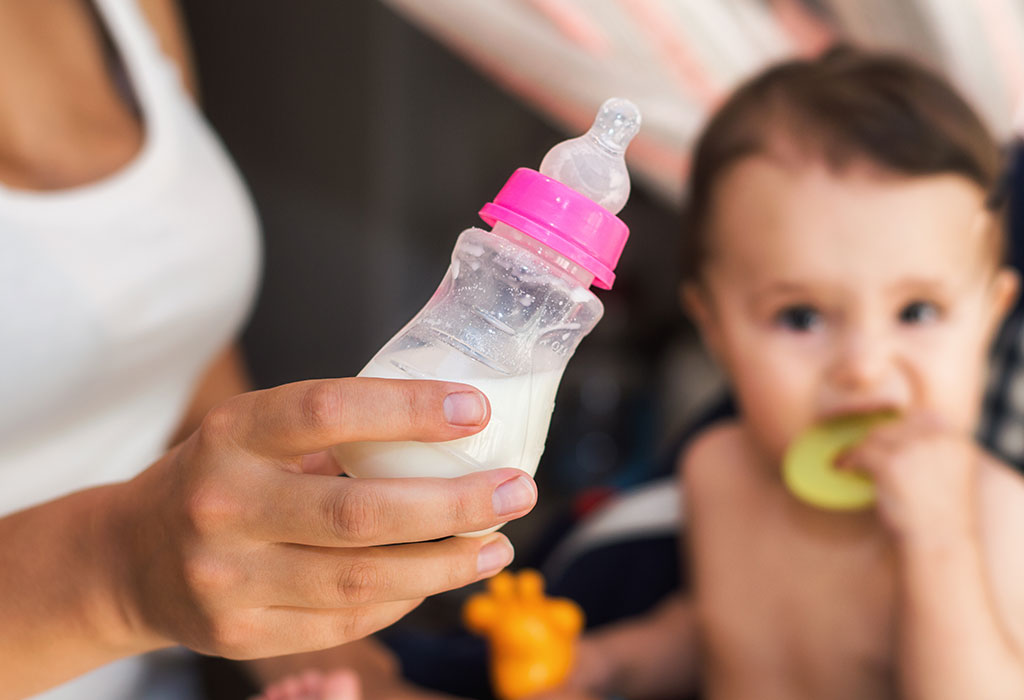In this Article
- Is Formula Milk Allergy Common in Babies?
- What Are the Causes of Formula Allergy in Infants?
- Signs and Symptoms of Formula Milk Allergies in Babies
- How to Diagnose Formula Allergy in Babies
- What to Do If a Baby is Allergic to Formula
- Can Formula Allergies Be Treated?
- What Complications Can Arise If Your Baby Has a Milk Allergy?
- What Is the Difference Between Milk Allergy and Milk Intolerance?
Food allergies are common in babies and children. Some common foods which cause allergies include milk, soy, nuts, gluten, peanuts, etc. It is important to recognise the signs of an allergy in a baby, so that he can be diagnosed and treated as quickly as possible. Sometimes, cow’s milk (and therefore, baby formula) can also lead to allergic reactions in a baby. This article will help you understand the reasons and symptoms of formula allergy in babies, and what can be given to a baby who has milk allergy.
Is Formula Milk Allergy Common in Babies?
When a baby has a milk allergy, it basically means that his immune system reacts unfavourably to a particular protein or proteins present in the milk. Cow’s milk and its related products can, therefore, trigger allergic reactions. It is possible for a baby to be exposed to the allergens in cow’s milk if the mother consumes the same or dairy products while breastfeeding. Similarly, consuming cow milk protein-based formula can also trigger allergic reactions, thus leading to a formula allergy. Around two to eight per cent of babies below the age of one exhibit symptoms of cow’s milk allergy. Usually, a milk allergy tends to subside by the time babies turn three years old. But in some cases, it may persist until seven to eight years of age.
What Are the Causes of Formula Allergy in Infants?
Can babies be allergic to formula milk? Yes, it is indeed possible for a baby to be allergic to formula milk, as the immune system treats specific components of formula as enemies and starts attacking them. There are a few probable causes of this allergy. One of them is genetics. If anyone in the baby’s immediate family has had a formula allergy in their childhood, the baby has a fifty to eighty per cent chance of inheriting it. Babies who are nursed have a lower chance of developing a milk allergy as compared to babies who are given formula milk. This is mainly because most infant formula is made with cow’s milk. Thus, if you give cow milk protein-based formula to your baby, he may exhibit signs of an allergy, if he is allergic to cow’s milk protein. However, it is still unclear why some babies are allergic to milk while others are not.
Signs and Symptoms of Formula Milk Allergies in Babies
Some newborns may show symptoms of cow’s milk allergy within seconds or minutes of consuming it, while in others, the symptoms might take hours or days to manifest. If your baby is allergic to cow’s milk protein that’s present in the formula he’s fed, he may exhibit the following signs.:
1. Gas
Your baby might have a bloated or tensed abdomen, indicating gassiness. He might even pull his legs up and release gas more often than usual.
2. Reflux
It is common for babies to experience acid reflux, which is basically the food in the stomach returning to the mouth via the oesophagus. This is why babies tend to spit up. In extreme cases, your baby may spit up and vomit. He may even experience difficulty in swallowing and react negatively towards feeding time or seem fussy when being nursed.
3. Diarrhoea
Breastfed babies have runny, chunky stools, whereas formula-fed babies have thicker stools. If your baby has loose or watery stools more than 3-4 times a day for at least a week or if you notice blood in his stools, then he might have diarrhoea. Diarrhoea is a symptom of formula mik allergy, wherein the stools are watery, loose, and have a foul smell. Frequent diarrhoea can lead to severe dehydration, so do consult your baby’s paediatrician immediately.
4. Rash

If your baby has rash-like symptoms, such as red bumps on his skin, it might be due to an allergic reaction. Babies allergic to formula tend to have rashes on their face too. The rashes might be itchy, secrete fluids, or resemble crusty scales. Another common symptom of formula milk allergy is the presence of raised welts or hives on the skin.
5. Breathing Problems
While colds and the flu are common in babies, a consistent runny nose, difficulty in breathing, raspy breaths, phlegm in the throat, and a chronic cough might be because of a formula milk allergy.
6. Colic
If a baby cries continuously even when he is not hungry or sleepy, then it might be a sign of colic. The rule of three applies to colic – if your baby cries for three hours or more every day, for at least three days a week for at least three weeks, then he may have colic. Colic tends to get better after the first six months.
7. Constipation
Sometimes, formula milk allergy can even lead to constipation in babies. If your baby has constipation, his faeces may resemble small hardened balls or pellets. He may also have blood in his stools.
How to Diagnose Formula Allergy in Babies
Ideally, you should provide your doctor with enough details about the symptoms you notice in your baby so he can diagnose the condition. You should also inform him about the history of allergies in your immediate family. There are no specific tests to diagnose milk or formula allergy in babies. However, the doctor might suggest certain tests after you inform him about the symptoms. These tests include allergy tests, blood tests, and stool tests.

What to Do If a Baby is Allergic to Formula
If your doctor concludes that your baby is allergic to formula, then the first thing you should do is elimination; that is, the removal of all dairy products from your baby’s diet. This means that you too cannot consume dairy products while nursing, as the proteins from the milk can reach your baby through your breast milk. Milk allergy is complicated because more than half the babies who are allergic to dairy can also be allergic to soy milk, which is the standard alternative. Feeding your child alternative baby formula for cow’s milk allergy should help reduce his symptoms within a few days to a week.
There are some options available for babies who are allergic to milk- and soy-based formula. Hypoallergenic formula, which has been scientifically created to exclude allergens in dairy, are made using enzymes to break down the milk proteins in the milk. They are further classified into two types – hydrolysed formula and amino acid-based formula. The latter is good for babies who are not able to take to hydrolysed forumla. It’s also important to note that the more the formula is hydrolysed, the less tasty it could be for your little one.
Breast milk is the best source of nutrition for a baby. If your baby has formula milk or cow’s milk allergy, you should continue to breastfeed him for as long as you can.
Can Formula Allergies Be Treated?
Currently, there is no proven treatment to get rid of formula allergies completely. The recommended course of treatment is to avoid allergens entirely and to opt for an alternative source of nutrition.
What Complications Can Arise If Your Baby Has a Milk Allergy?
If your baby is allergic to milk, he is likely to also develop health complications like hay fever, which is an allergic response to allergens such as dust mites, pollen, and pet dander. He may also be allergic to other foods such as eggs, peanuts, soy, etc.
What Is the Difference Between Milk Allergy and Milk Intolerance?
Many parents mistake milk intolerance for milk allergy. However, the two are not the same. Milk allergy is when a baby’s immune system reacts negatively against the proteins in cow’s milk or cow milk protein-based formula. But milk intolerance has nothing to do with the immune system. It comes about when the digestive system is unable to tolerate the sugar lactose that is present in milk or dairy products. It is also called lactose intolerance. This problem is somewhat rare in babies and tends to develop in older children and adults.
It is difficult having to care for a baby who cries a lot or behaves in a fussy manner, and even more so if you cannot tell if this behaviour is because of his mood or due to a health complication. The best thing would be to consult your child’s paediatrician if you are worried he might be allergic to something in his diet. However, please remember that babies tend to contract illnesses such as colds and the flu often, as their immune systems are not developed fully yet. These illnesses can have the same symptoms as a milk allergy but should disappear after being treated. If you notice the symptoms described in this article in your baby whenever he is fed formula, it would be best to consult a doctor at the earliest.









